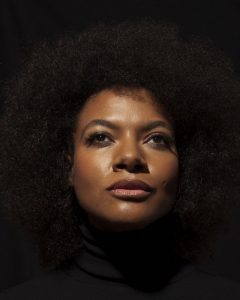Allison Russell has placed her hometown of Montréal at the heart of her first career solo album. The singer-songwriter, now based in suburban Nashville, has overcome her writer’s block to deliver the sublime, often painful, but redemptive Outside Child, in which she reclaims her story of being an abused child who found her “lifeline” in the Québécois metropolis.
 “I’m happy to be back in Montréal,” says Allison Russell, born there to Scottish and Grenadian parents. “Today, my adoptive father – who was the source of the abuse I experienced as a child – and my mother have moved to Ontario. My ghosts have left town, so when I go back, it’s with my family, my musician friends, and it’s always nice to go back, really,” says the musician, who insists on conducting this interview in French. “I try to practise as much as possible with my daughter, who loves to speak in a language her father doesn’t understand!”
“I’m happy to be back in Montréal,” says Allison Russell, born there to Scottish and Grenadian parents. “Today, my adoptive father – who was the source of the abuse I experienced as a child – and my mother have moved to Ontario. My ghosts have left town, so when I go back, it’s with my family, my musician friends, and it’s always nice to go back, really,” says the musician, who insists on conducting this interview in French. “I try to practise as much as possible with my daughter, who loves to speak in a language her father doesn’t understand!”
It’s also a language that she sings in, with the same ease as she answers our questions. On Outside Child, several songs have stanzas, even full verses, in French, as on “The Hunter,” a song recalling her youth in Quebec: The heart of the child is the heart of the universe, golden love / Like many springs, generous, warm / But never innocent / Nor completely painless.
“That’s why the album starts with the song “Montréal,” she says. “This record is really a tribute to my city. Montréal was my mother when my mother couldn’t take it anymore. In a way, the identity and cultural activity of Montréal saved me. The outdoor concerts at the Jazz Festival saved me, as well as my visits to the Museum of Fine Arts,” says the musician, who was fleeing the house to avoid her attacker.
On the powerful “4th Day Prayer,” she sings: I was the Queen of Westmount Park / It was all mine after dark / Old willow tree it was my throne / Till I, till I went home. Russell says that Montréal protected her, “with its coffee houses open all night, I would go there to play chess until the wee hours of the morning. I think back to all those places where I could go, where I also received a form of education, an artistic training, where I met a lot of nice people. I think that in my misfortune, I was really lucky.”
Russell moved to Vancouver when she came of age, where she had her first experiences as a professional musician, co-founding the band Po’Girl. With her daughter’s father, JT Nero, she founded the folk/gospel/Americana duo Birds of Chicago in 2012. At 42, she’s finally releasing her first solo album, after overcoming the writer’s block that emerged after the birth of her daughter.
“For four years, I hardly composed anything,” she says. “I deduced that I wasn’t a singer-songwriter, only a musician. I think it was because of the weight of the responsibility of becoming a mother: what I write, what I sing, I thought that one day my daughter would listen to it and interpret it in her own way.”
It was through another musical adventure that Russell found her voice: her friend Rhiannon Giddens, one of the most brilliant musicians on the folk/Americana scene, recruited her for the Our Native Daughters project. “We had 10 days to write and record an album, which was very intense, and forced me to start writing again. Once the floodgates of inspiration opened, I couldn’t stop. I had a lot of songs that needed to be released,” says Russell, who writes mainly on banjo and guitar.
“I do a lot of running, marathons, stuff like that, it’s therapeutic for me,” she says. “Songs often come to me while I’m running, and then I decide if it’s better suited for the banjo or the guitar. Sometimes it’s the melodies that come to me first, sometimes it’s just a phrase. A fragment of a song, from which you have to look around to find the rest. Sometimes a song idea comes to me just by reading; when a phrase strikes me, I try to figure out why.”
All of the songs on Outside Child were written during the Our Native Daughters tour, beginning in July of 2019. In September of that year, Russell invested her Canada Council grant to book four days in the studio with her Nashville musician friends, who bring these powerful songs to life. “I felt an urgency to write,” she says. “It became important to me to express vocally what I’ve been through, to end the cycles of violence – racism, sexism, sexual violence. It’s also very important to me to write my own story, and be able to tell people that it’s survivable.”